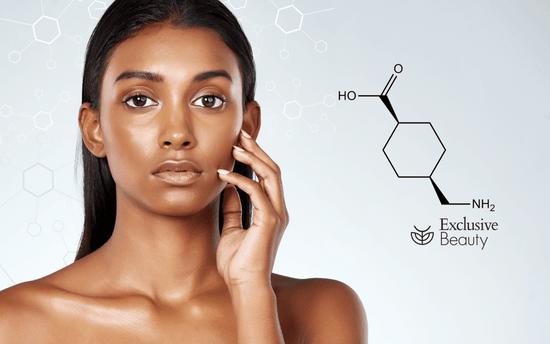

Introduction: Exosomes vs. Growth Factors
Exosomes and growth factors are emerging as powerful tools in skincare, offering a new solution for addressing a wide range of skin concerns. As the understanding of these biological entities continues to deepen, their integration into many skincare products has opened up new possibilities for improving skin health. In this blog, we’ll be diving into the distinctive roles and mechanisms of action of exosomes and growth factors, the benefits of each, and introduce some brands that are harnessing the power of exosomes and growth factors. By the time you’re finished, you should have a comprehensive understanding of how these two distinct components compare, and how they’re innovating the skincare industry by delivering transformative results.
Table of Content

All About Exosomes
What is an Exosome?
Exosomes are small membrane-bound vesicles that are released by most cell types, including both healthy and diseased cells. They typically range in size from 30 to 150 nanometers in diameter and play a crucial role in cell-to-cell communication by transferring various biomolecules between cells.
Key Features and Functions of Exosomes:
Formation and Composition: Exosomes are formed within specialized compartments inside cells called multivesicular bodies (MVBs). These MVBs contain intraluminal vesicles (ILVs) that are created by the inward budding of the endosomal membrane. When MVBs fuse with the cell membrane, the ILVs are released into the extracellular space as exosomes. Exosomes usually contain a cargo of proteins, lipids, nucleic acids (such as RNA and DNA), and metabolites.
Intercellular Communication: Exosomes are important mediators of communication between cells. They can be taken up by recipient cells through endocytosis, membrane fusion, or receptor-mediated internalization. Once inside the recipient cells, exosomes can deliver their cargo, such as proteins or RNA, to modulate the recipient cell's behavior or function.
Exosomes; Explained in Simple Terms
If you can’t wrap your head around the first explanation, no worries, we’re not all scientists! Try this explanation instead:
Imagine that your body is like a big city where different cells work together and talk to each other to keep everything running smoothly. Now, inside these cells, there are tiny little packages called "exosomes."
Think of exosomes as little messengers or delivery trucks that cells use to communicate with each other. These exosomes are like tiny bubbles made up of a special type of material called a membrane. Inside these bubbles, there are important messages and molecules like proteins, genetic instructions (RNA), and other helpful substances.
When a cell wants to tell another cell something or share something important, it sends out these exosomes. The exosomes travel through your body and deliver their messages or cargo to other cells. This helps cells work together, share information, and keep everything in balance.
So, exosomes are like small packages that cells use to talk to each other and share important information, and they play a big role in keeping your body healthy and making sure everything works properly!
How are Exosomes Used in Skincare?
In skincare formulations, exosomes are typically incorporated into products like serums, creams, or masks. The use of exosomes in skincare is an evolving area of research and development, with ongoing studies exploring their potential applications and optimizing their formulations for various skincare needs.
Delivery of Active Ingredients: Exosomes can be loaded with specific biomolecules like growth factors, peptides, and nucleic acids that support skin regeneration, collagen production, and overall skin health. When applied topically, exosomes can effectively deliver these active ingredients directly into skin cells, potentially enhancing their efficacy compared to traditional skincare products.
Enhanced Penetration: Exosomes are naturally equipped to interact with and fuse with cell membranes, which can potentially enhance the penetration of skincare ingredients into skin cells, ensuring better efficacy of the active compounds.
Benefits of Exosomes for Skin Health
Here are the key ways exosomes can positively impact skin health and appearance:
Collagen and Elastin Stimulation: Exosomes carry growth factors and signaling molecules that can stimulate fibroblasts, the cells responsible for producing collagen and elastin. This leads to increased synthesis of these essential structural proteins, helping to improve skin elasticity and reduce the appearance of wrinkles and fine lines.
Skin Regeneration and Repair: Exosomes contain nucleic acids and proteins that promote cell proliferation and tissue regeneration. They can accelerate the skin's natural healing and renewal processes, aiding in the repair of damaged skin cells and supporting overall skin rejuvenation.
Skin Barrier Reinforcement: Exosomes derived from certain cell types, such as keratinocytes, can enhance the skin's protective barrier function. They stimulate the synthesis of lipids and proteins that strengthen the barrier, reducing moisture loss and shielding the skin from external aggressors.
Anti-Inflammatory Effects: Exosomes possess anti-inflammatory properties and can modulate immune responses in the skin. They may help calm inflammation associated with various skin conditions, including acne, eczema, and rosacea, promoting a more balanced and healthier complexion.
Pigmentation and Dark Spot Reduction: Exosomes can regulate melanin production and distribution in the skin, helping to fade hyperpigmentation, dark spots, and uneven skin tone.
Skin Aging Prevention: Exosomes have antioxidant properties and can counteract oxidative stress, a major contributor to skin aging. By neutralizing free radicals and promoting cellular health, exosomes contribute to the prevention of premature aging signs.
Best Skincare Products with Exosomes

All About Growth Factors
What are Growth Factors?
Growth factors refer to a group of proteins that play crucial roles in regulating cell growth, proliferation, and differentiation. These proteins are naturally produced by various cells in the body and are involved in important physiological processes, including wound healing, tissue repair, and maintaining skin health.
For use in skincare formulations, synthetic or recombinant growth factors are often incorporated to target specific skin concerns and promote skin rejuvenation. Here's a closer look at growth factors in skincare:
How are Growth Factors Used in Skincare?
Growth factors represent a promising avenue in skincare science, offering targeted solutions for addressing aging, damaged, or compromised skin by harnessing the natural mechanisms of cellular communication and tissue repair.
Types of Growth Factors:
Epidermal Growth Factor (EGF): Promotes cell growth, proliferation, and wound healing.
Transforming Growth Factor-Beta (TGF-β): Stimulates collagen production and tissue repair.
Fibroblast Growth Factor (FGF): Supports the growth of fibroblasts, which produce collagen and elastin.
Platelet-Derived Growth Factor (PDGF): Plays a role in wound healing and tissue regeneration.
Application in Skincare: Growth factors are incorporated into various skincare products, such as serums, creams, and masks. When applied topically, they can penetrate the skin and interact with receptors on skin cells, triggering cellular responses that contribute to skin rejuvenation and repair.
Combination with Other Ingredients: Growth factors are often combined with other active ingredients, like peptides, antioxidants, and hyaluronic acid, to enhance their efficacy and provide comprehensive skincare benefits.
Suitability and Safety: While growth factors can offer significant benefits for skin health and appearance, it's important to use them as directed and consult with a dermatologist or skincare professional, especially for individuals with sensitive skin or specific skin conditions.
Benefits of Growth Factors:
Growth factors can positively impact various cellular processes, contributing to improved skin health, regeneration, and overall appearance. Here are the key ways growth factors can benefit the skin:
Collagen and Elastin Stimulation: Growth factors play a crucial role in regulating the production of collagen and elastin by stimulating fibroblasts, the primary cells responsible for synthesizing these structural proteins. This helps improve skin firmness, elasticity, and resilience, reducing the appearance of wrinkles and fine lines.
Skin Repair and Regeneration: Growth factors promote cell proliferation and tissue regeneration, accelerating the skin's natural healing processes. They aid in repairing damaged skin cells, supporting wound healing, and minimizing the appearance of scars or blemishes.
Improved Skin Texture and Tone: By encouraging cell turnover and renewal, growth factors help improve overall skin texture and tone. They contribute to a smoother, more even complexion by reducing roughness, dullness, and discoloration.
Hydration and Moisture Retention: Certain growth factors stimulate the production of hyaluronic acid and other moisturizing molecules, helping improve skin hydration levels and resulting in softer, more supple skin with a healthy glow.
Anti-Aging Effects: Growth factors combat visible signs of aging, such as wrinkles, sagging, and loss of skin tone, by supporting essential skin functions and promoting cellular vitality, contributing to a more youthful and radiant appearance.
Pigmentation Regulation: Specific growth factors can modulate melanin production and distribution, helping to fade hyperpigmentation, dark spots, and uneven skin tone for a more balanced complexion.
Skin Barrier Support: Growth factors contribute to the maintenance and strengthening of the skin's protective barrier, which is crucial for retaining moisture and shielding the skin from external irritants.
Overall Skin Health: By orchestrating various cellular activities, growth factors play a central role in maintaining the skin's structural integrity, facilitating repair, and optimizing essential biological processes within skin cells, promoting overall skin health and resilience.
Best Skincare Products with Growth Factors

Exosomes vs. Growth Factors In Skincare
Key Differences Between Exosomes and Growth Factors
While both growth factors and exosomes play important roles in cellular regulation and tissue homeostasis, they do so through distinct mechanisms. Growth factors directly stimulate cellular responses through receptor-mediated signaling, while exosomes facilitate intercellular communication by transporting a diverse array of biomolecules. The unique properties of these two entities offer complementary avenues for advancing skincare treatments and regenerative therapies.
Composition
Growth Factors
Growth Factors are proteins that are typically produced and secreted by cells, acting as signaling molecules that bind to cell surface receptors.
Exosomes
Exosomes are small membrane-bound vesicles released by cells, containing a cargo of various biomolecules including proteins, lipids, nucleic acids, and metabolites.
Mechanism of Action
Growth Factors
Growth Factors exert their effects by binding to specific receptors on cell surfaces, initiating intracellular signaling pathways that regulate gene expression and cellular processes like growth, proliferation, and differentiation.
Exosomes
Exosomes mediate intercellular communication by transferring their cargo of biomolecules to recipient cells, influencing gene expression, protein synthesis, and other cellular activities in the recipient cells.
Scope of Influence
Growth Factors
Growth Factors primarily influence cellular processes directly related to cell growth, differentiation, and tissue repair.
Exosomes
Exosomes have a broader scope of influence, as their cargo can modulate diverse cellular functions such as immune response, inflammation, and metabolism, in addition to promoting tissue regeneration.
Application in Skincare
Growth Factors
Growth Factors are commonly used as active ingredients in anti-aging and skin rejuvenation products, helping to improve skin texture, reduce wrinkles, and promote overall skin health.
Exosomes
Exosomes are still emerging as innovative components in skincare formulations, leveraged for their role in enhancing the delivery of active ingredients, supporting skin barrier function, and addressing various skin concerns.
Which is Better in Skincare; Exosomes or Growth Factors?

Exosomes Are Better Suited For:
Skin Barrier Function and Hydration: Exosomes derived from specific cell types, like stem cells or keratinocytes, can help strengthen and support the skin's protective barrier. This can lead to improved moisture retention, reduced transepidermal water loss, and overall enhanced skin hydration.
Anti-Inflammatory Effects: Certain exosomes possess inherent anti-inflammatory properties. This makes them well-suited for addressing inflammatory skin conditions like acne, eczema, and rosacea.
Broad Cellular Signaling and Modulation: Exosomes can influence a wide range of cellular functions beyond just structural components. This versatility allows them to potentially address more complex or multifactorial skin concerns.
Growth Factors Are Better Suited For:
Collagen and Elastin Stimulation: Growth factors, such as TGF-β and FGF, are more directly involved in stimulating the production of collagen and elastin. This makes them particularly effective for targeting signs of aging, like wrinkles and loss of skin firmness.
Skin Regeneration and Repair: Growth factors can more specifically promote cell proliferation, tissue regeneration, and wound healing. This makes them well-suited for addressing skin damage, scarring, and accelerating the skin's natural healing processes.
Targeted Modulation of Cellular Processes: Growth factors act through well-defined receptor-mediated signaling pathways, allowing for more targeted regulation of specific cellular functions. This can be advantageous for addressing more specific skin concerns, like pigmentation or age-related changes.
In practice, a combination of exosomes and growth factors may provide the most comprehensive and synergistic benefits for the skin, addressing a broader range of concerns. The optimal choice would depend on the individual's specific skin needs and the desired outcomes of the skincare regimen, in consultation with a dermatologist or skincare professional.
Conclusion
As science in skincare continues to grow and evolve, the integration of innovative, science-backed ingredients like exosomes and growth factors has opened up transformative possibilities for the skin. These biomolecules have continuously demonstrated the ability to address a wide range of skin concerns, from combating visible signs of aging to supporting the skin's protective barrier and facilitating cellular repair.
Exosomes, with their unique capacity to facilitate intercellular communication, have emerged as versatile tools that can deliver a cargo of beneficial compounds directly to skin cells. By reinforcing the skin's barrier, modulating inflammatory responses, and stimulating regenerative processes, exosomes have the potential to revitalize the complexion and restore a youthful, radiant glow. Growth factors offer targeted solutions for specific skin needs, from stimulating collagen and elastin production to promoting skin regeneration and repair.
The synergistic power of exosomes and growth factors represents an exciting frontier in the realm of skincare, offering personalized and innovative solutions that empower individuals to achieve their skin goals and maintain a youthful, beautiful complexion for years to come.

Frequently Asked Questions
Are exosomes safe for sensitive skin?
Exosomes themselves are natural components involved in intercellular communication and tissue repair, and they are generally considered safe.
However, the safety of using skincare products containing exosomes on sensitive skin can vary depending on individual tolerance and the specific formulation of the product. Consult with a dermatologist.
Are exosomes safe for women who are pregnant or breastfeeding?
The safety of using skincare products containing exosomes during pregnancy or while breastfeeding has not been extensively studied. Given the lack of specific safety data on exosomes in skincare during pregnancy and breastfeeding, erring on the side of caution is recommended.
How long does it take to see results from exosome treatments in skincare?
Generally it takes 1-3 months before significant changes are visible. However, some people report seeing results in as little as 1 week.
Related Readings
- Choosing a selection results in a full page refresh.









